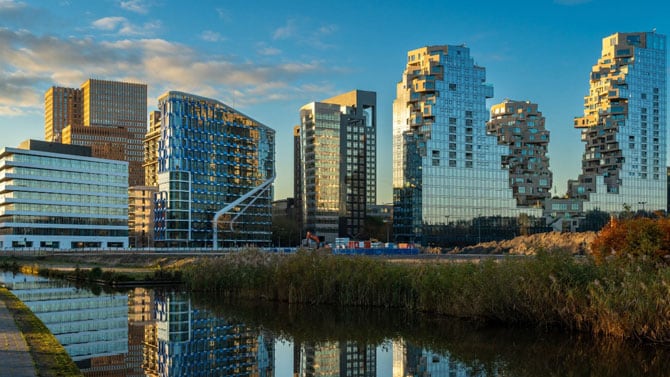
Why invest in the Netherlands
Why invest in the Netherlands?
The Netherlands is one of the most open economies in the world and among the best countries in terms of technology and innovation. It offers an excellent infrastructure - including the largest port in Europe - a competitive business climate and a well-educated workforce. The Dutch tax system features several tax incentives to stimulate innovation and business activities and, as an internationally oriented country, the Netherlands is home to many highly educated foreign workers.

Business climate
A favourable business environment, its strategic location, a highly educated multilingual workforce, its leading position on research and innovation, and superior logistics and technology infrastructure are just some of the many advantages of doing business in the Netherlands. Strategically located in Europe, the Netherlands serves as a practical entry point to the European market, with 95% of Europe’s major consumer markets accessible within 24 hours from Amsterdam or Rotterdam. These factors position the Netherlands as an effective (digital) gateway to Europe.
The Netherlands stands as a premier destination for business activity. Consequently, many multinational businesses, from small and mid-sized companies to Fortune 500 leaders, have chosen the Netherlands as their gateway to Europe. In addition to its business-friendly environment, the Netherlands provides an affordable cost of living and a high quality of life. Ranked as the number 6 in the United Nations World Happiness Report 2024, the country continues to be recognised for its quality of life and work-life balance.
The Netherlands also offers a supportive legal and tax framework for establishing businesses. It offers a wide tax treaty network, a competitive tax system and certainty in advance of interpretation of tax law for sound business cases, including those related to the new global minimum tax Act (often referred to as Pillar Two) - just a few of the features that help multinational companies to be successful in the Netherlands.

Talent and workforce of the future
Workforce in the Netherlands
The Netherlands has a diverse, well-educated, digitally skilled, flexible, and multilingual workforce. It is internationally recognised for its talent competitiveness, ranking 5th in the Global Talent Competitiveness Index 2023, which evaluates the ability of countries and cities to nurture, attract, and retain talent. Factors contributing to its high ranking on growing talent include the quality of tertiary education, robust performance in formal education and lifelong learning, and the widespread use of virtual networks.
Research by Statistics Netherlands (CBS) and Eurostat indicates that the Netherlands is a leading country in Europe when it comes to digital competence and online skills. While 83 per cent of the Dutch citizens has at least basic overall digital skills, 54 per cent has above basic skills. According to the EF English Proficiency Index, the Dutch are the best non-native English speakers worldwide. The country’s strong international business climate is supported by this high English proficiency, which aids in attracting talent, fostering innovation, and ensuring smooth communication. It also helps create a diverse and collaborative international work environment. The Netherlands offers a ‘Highly Skilled Migrant Visa’, which allows companies to bring highly qualified expats to their Dutch operations.
The Dutch higher education system consists of highly regarded universities and educational institutions. Some universities rank in the top 10 of the QS World University Rankings on specific programs, like Wageningen University & Research in agriculture (1st position), TU Delft in architecture and built environment (3rd position) and mechanical, aeronautical & manufacturing engineering (3rd position), and Design Academy Eindhoven in arts and design (9th position). The close collaboration between the Dutch government, knowledge institutions, the industry/private sector and other parties, ensures that the country remains talent-competitive in the future.
The Dutch labour market is strong but very tight. In December 2024, the new Dutch cabinet sent a letter to the House of Representatives outlining its plans to alleviate the labour market shortage. The cabinet’s plans focus on five key policies, addressing both labour demand and supply.
- Improving the quality of work;
- Strengthening the economy;
- Increasing productivity, the cabinet will develop a productivity agenda before the summer of 2025;
- Enhancing sustainable labour participation;
- Improving labour market matching.
The cabinet plans to hold a labour market summit in the first quarter of 2025 to establish additional agreements with social partners and sectors.
Diversity, equity and inclusion (DE&I)
The Dutch government strives to protect and promote human rights, such as equality, non-discrimination, freedom of speech and freedom of sexual orientation, both at home and abroad. It is also committed to promoting diversity, equity and inclusion within organisations.
As the expectations of employees, customers, and investors evolve, organisations are investing in diversity, equity, and inclusion (DE&I) programs. By doing so, they aim to not only increase engagement with these stakeholders but also improve financial performance and foster innovation. According to PwC research, inclusive organisations with a diverse composition of employees increase stakeholder engagement and operate more effectively. Teams with a diverse composition - where everyone can be themselves - perform better and are more innovative.
Innovation and incentives
Part of the Dutch DNA
The Netherlands is recognised for its notable achievements in innovation. According to the Global Innovation Index 2024 by the World Intellectual Property Organization, it excels in multiple aspects of innovation, such as government effectiveness, regulatory quality, entrepreneurship policies and culture, finance for startups and scaleups, knowledge-intensive employment, university-industry collaboration, and research talent. In terms of innovation outputs, the Netherlands particularly stands out in the areas of knowledge creation and online creativity.
Dutch industry includes many innovative and knowledge-intensive companies with a strong global reputation, actively engaged in extensive R&D efforts. Additionally, the Netherlands hosts several successful and innovative clusters, such as agrifood, life sciences & health, high-tech systems, chemicals, clean energy, IT, and creative industries.
Stimulating foreign investment and entrepreneurship
With a competitive corporate income tax rate in Europe – 19 per cent on the first 200,000 euro and 25.8 per cent for taxable profits exceeding 200,000 euro – as well as a number of attractive incentive programs, the Netherlands offers a supportive fiscal climate for international companies.
The Netherlands actively promotes engaging in R&D activities through a favourable corporate tax structure and specific R&D tax incentives to stimulate innovation. We will elaborate on the Dutch incentives and taxes later on.
Digital transformation
The Netherlands is a strong performer in digital transformation, both within Europe and on a global scale. According to the EU report on the State of the Digital Decade 2024, the country has a leading position on digital skills and digital infrastructure and scores high on many businesses and public services digitalisation indicators. Furthermore, Dutch consumers are often early adopters of innovative digital applications.
The Netherlands is a significant player in various digital technology fields. It leads in quantum technology, hosts Europe’s largest cybersecurity cluster, and has one of the most advanced data centre operations markets in Europe. Additionally, it is a hub for companies involved in the global gaming industry, including both serious and entertainment gaming. The country is also a leader in E-health solutions and is home to several artificial intelligence (AI) innovators.
In November 2022 the Ministry of Economic Affairs and Climate Policy launched the Strategy Digital Economy for the period until 2030 with the ambition to realise a resilient, entrepreneurial, innovative and sustainable digital economy, in which everyone in the Netherlands can participate. To realise this ambition the Dutch government commits itself to five priorities: accelerating digitisation of SMEs, creating the right conditions for well-functioning digital markets and services, maintaining and strengthening a secure, reliable and high-quality digital infrastructure, strengthening cybersecurity and boosting digital innovation and skills. Digital innovation will be stimulated by investing publicly-privately in conditions for cloud applications and in digital technologies, such as artificial intelligence, quantum, blockchain and 5/6G.
Recognising the significance of artificial intelligence, the Dutch government launched the Strategic Action Plan for AI in 2019 to maintain its position as a frontrunner in this field. To expedite the adoption of AI, the Netherlands is proactively facilitating cross-industry collaboration. In 2019, the NL AI Coalition (NL AIC) was formed to bring together Dutch research institutes, companies, and public organisations with the aim to put the Netherlands in a frontrunner position in terms of AI knowledge and applications. The coalition has set up the AiNed programme to further increase its impact by helping Dutch companies and public institutions take essential steps with AI. As of 1 January 2025, the N L AI Coalition and AiNed have joined forces under the name AI Coalition 4 NL (AIC4NL). The closely connected Innovation Center for Artificial Intelligence (ICAI) plays a vital role in facilitating and coordinating activities among around 50 AI innovation labs throughout the Netherlands.
The world’s first AI regulation, the Artificial Intelligence Act (AI Act), went officially into effect throughout the EU, including the Netherlands, on 1 August 2024. The act aims to ensure the responsible and ethical use of artificial intelligence while simultaneously promoting innovation and competition.
Sustainable economy
Towards a circular economy
When it comes to circular material use, the Netherlands stands out as the leading country in the European Union. In 2023 the Netherlands achieved a circular material use rate of 30.6 per cent, followed by Italy and Malta, with respectively 20.8 per cent and 19.8 per cent.
Over the past few years, the focus on the circular economy has significantly increased, and the Netherlands is no exception. The Dutch government aims for a fully circular economy by 2050. To achieve this, it collaborates with industry, knowledge institutions, civil-society organisations and other authorities. In 2023 the government has presented the National Circular Economy Programme 2023-2030, which outlines the necessary measures to realise a fully circular Dutch economy by 2050. The plan aims to reduce the consumption of primary raw materials by half in 2030.
In addition to implementing general and specific measures, the Dutch government is taking various initiatives to promote the circular economy. For instance, it seeks to increase knowledge and skills through education and offering short courses for professionals. It will also offer support by providing funding, promoting behavioural change, the Acceleration House Netherlands Circular! Initiative and regional circular economy networks.
Advancing the energy transition
The Netherlands has set ambitious goals for sustainable energy generation. According to the National Climate Agreement of 2019, by 2030, 70 per cent of electricity and at least 27 per cent of all energy used must come from renewable sources. The European Climate Act, which came into effect on July 29, 2021, has further strengthened greenhouse gas emission reduction targets for the European Union. In line with the European Climate Act, the Netherlands has committed itself to achieve a 55 per cent reduction in CO2 emissions by 2030. The Ministry of Climate Policy and Green Growth of the in 2024 newly formed Dutch government has indicated that it will continue to work diligently towards the climate goals and the energy transition of the Netherlands. The new government remains committed to green innovation and growth, renewable sources and supply security and addressing the grid congestion issues. However, partly because the new government has abolished several old climate measures and plans, the climate goals for 2030 no longer seem achievable. The Ministry therefore is working on alternative measures to keep the climate goals for 2030 within reach.
The Netherlands is known for its advancements in renewable energy R&D. It is home to various major international offshore wind energy initiatives and the Dutch government has set the ambitious target for offshore wind capacity of 21 gigawatts by 2032. The country has also emerged as the leading solar power player in Europe when it comes to the number of panels per capita. Furthermore, it is one of the world’s leading countries with respect to the adoption of electric vehicles and in July 2024 still had the largest number of public charging points in the EU.
The Netherlands is at the forefront of innovation in the fields of green hydrogen, battery, and smart-grid energy technologies. To accelerate the production and utilisation of (low carbon) hydrogen, the Dutch government has embraced a comprehensive hydrogen strategy. The National Hydrogen Programme is playing an important role in driving the adoption of hydrogen across various sectors.
Additionally, the Netherlands offers energy related R&D facilities and incentive programs that support and stimulate innovation.
Gateway to Europe
A superior logistic and technology infrastructure
According to the DHL Global Connectedness Index 2024 report the Netherlands is world’s second most globally connected country in the world. The country has maintained a strong position at the top of the index thanks to its combination of favourable geography, strong regional integration with neighbouring countries, the attractiveness of its domestic market and a long tradition of embracing international trade and relations. Supported by top-tier seaports and airports, an extensive network of roads, rail, and waterways, as well as a telecommunications network that is globally recognised for its high quality, speed, and reliability, the Dutch infrastructure is regarded as among the best globally.
With its strong logistics infrastructure and strategically in the heart of the European Union, the Netherlands provides companies with outstanding access to the continent and beyond. Businesses can efficiently reach a market of 170 million consumers within a 24-hour radius of Amsterdam or Rotterdam, whether by rail, road or water.
Additionally, the Dutch dense, high-quality telecommunications infrastructure offers fast connections. With a 99 per cent fast broadband coverage and a 99 per cent 5G coverage, the country serves as the digital gateway to Europe. The Netherlands directly connects continental Europe to North America, with most transatlantic sea cables landing there. Furthermore, the Netherlands is home to the Amsterdam Internet Exchange (AMS-IX), one of the largest hubs for internet traffic in the world.
PwC Netherlands, supported by the strong EU Direct Tax Group network of EU colleagues, aims to provide a coordinated support for non-EU clients to navigate through the complex EU tax and legal landscape. At the same time, it supports other EU colleagues on Netherlands related topics in their relationship with non-EU clients and colleagues. Additionally, PwC Netherlands takes a proactive role in informing clients on important EU tax law/EU27 domestic developments through the monthly EU Gateway newsletter, becoming by this way the EU first point of contact for non-EU clients and colleagues.
Business operations
Headquarters
Strategically located at the heart of Europe’s largest markets, the Netherlands has established itself as an attractive destination for international companies and a preferred location for establishing European or regional headquarters. With its strong international orientation, highly educated workforce, advanced logistics and technology infrastructure and innovation ecosystem, the Netherlands provides a conducive environment for companies to compete in Europe. As one of the European Union’s key trading and industrial centres, many companies use the Netherlands as an entry point to Europe.
Logistics and distribution
The Dutch transport and logistics infrastructure, which includes seaports, centrally located airports, and an extensive network of roads and highways, is a significant asset for companies looking to establish international logistics and distribution operations in Europe. Amsterdam Airport Schiphol is one of Europe’s best-connected airports and one of the largest cargo airports in Europe. The Port of Rotterdam is the largest seaport in Europe. Additionally, the Netherlands is also home to many high-standard logistic service providers. It is known for its ability to attract, develop, and nurture a skilled international workforce.
These and other elements position the Netherlands as a gateway to Europe, with a wide range of European and regional distribution centres across industries such as agrifood, fashion, high-tech, medical technology, e-commerce, and spare parts logistics.
Startups
The Netherlands is recognised for its open culture and focus on entrepreneurship and innovation, fostering a collaborative startup ecosystem. It is one of the leading European countries for startups, with the Amsterdam-Delta ranking 2nd in Europe in Startup Genome’s Global Startup Ecosystem Report 2024. According to Startup Genome, the Amsterdam-Delta has established itself as a flourishing startup ecosystem, fuelled by substantial funding, a pool of skilled talent, innovation hubs, and international events. The Dutch tech start-up ecosystem has a strong presence in different sub-sectors, notably healthcare and life sciences, agrifood and semiconductors. According to Startup Genome, the Dutch government’s commitment, exemplified by initiatives such as Invest-NL and the National Technology Strategy, further strengthens the ecosystem. Furthermore, initiatives such as Techleap and Netherlands Point of Entry link international companies to funding, talent and market opportunities within the Dutch startup ecosystem.
Under conditions, the Dutch startup visa scheme makes it possible to apply for a temporary residence permit as ‘start-up’, which gives ambitious starters one year to get their innovative business started.
Research and development
The Netherlands is known for its active engagement in R&D, supported by its research institutes, R&D tax incentives, and collaborations between science, industry, and government.
The country ranks 5th on the 2024 European Innovation Scoreboard of the EU Commission and is a significant R&D location for various multinational companies. It also has the 4th highest number of European patent applications per million inhabitants (2023, European Patent Office), with the Dutch startup scene contributing to numerous patents every year.
The Netherlands features various innovation hubs across the country, including ten campuses. These campuses, such as High Tech Campus Eindhoven, TU Delft Campus, Kennispark Twente, Wageningen Campus, Amsterdam Science Park and Campus Groningen, bring together a diverse range of companies and knowledge institutes. Furthermore, the Dutch government offers various R&D incentives to reduce R&D costs and investments, like the R&D tax credit (WBSO) scheme, the Innovation box and the Innovation credit scheme.
Manufacturing
The Netherlands has a skilled engineering workforce, a well-developed collaborative network of suppliers across various value chains, and an advanced logistics and distribution network. These factors provide advantages to companies looking to establish or reshore manufacturing operations in Europe. Also, the Dutch-style co-existence between government, the corporate sector and knowledge institutions, the so-called ‘triple helix’, has contributed to a manufacturing sector recognised globally for its innovation, productivity, dynamism, and economic performance. Many major multinationals in diverse industries, including life sciences, chemicals, maritime industry and IT, have already set up advanced manufacturing operations in the Netherlands.
Industries
Positioned at the front door of Europe, the Netherlands serves as a strategic base for businesses aiming to expand within the European market. Its position as a prominent business hub is supported by various industry clusters that contribute significantly to the country’s economic activity and growth. From life sciences and health to creative industries, the Netherlands hosts industry clusters that leverage the strength of the private sector and knowledge institutions, focusing on talent, innovation, and collaboration. Various large and rapidly expanding international companies in every industry have selected the Netherlands as their entry point to the European market.
We elaborate on some of the key industries below.
Key industries:
- Agrifood
- Logistics
- Energy
- Creative Industries
- High Tech Systems
- Chemicals
- Life Sciences and Health
Agrifood
- Among the top three of the largest exporters of agrifood products worldwide
- 123.8 billion euro agricultural exports, 18.3 per cent of total Dutch exports
- Houses production and R&D facilities of all the world’s leading agrifood companies
- One of the global leaders in food and agricultural technology
- Best global university for agricultural sciences worldwide - category agriculture and forestry (Wageningen University) according to QS World University Rankings 2024
Logistics
- The Netherlands ranks 2nd on the DHL Global Connectedness Index (2024 report)
- The Netherlands is known for its expertise in logistics, innovative transport and logistics concepts and chain management
- Dutch infrastructure is renowned for its exceptional quality
- Numerous American and Asian companies have chosen the Netherlands as the hub for their European distribution activities
- The Netherlands is at the forefront of environmentally sustainable logistics
- Schiphol is one of Europe’s best-connected airports and ranks among the largest cargo airports in Europe
- Rotterdam is the maritime capital of Europe and the world’s 10th largest container port (2023)
Energy
- The Netherlands has established itself as a prominent player in wind energy, especially in offshore wind power
- Leading solar power player in Europe by the number of panels per capita
- The Netherlands provides energy-related R&D and incentive programs to promote innovation
- The Netherlands is advancing green hydrogen, battery, and smart-grid energy technologies.
- The Dutch government has adopted a hydrogen strategy to enhance production and use of hydrogen
- Occupies the 10th position on the global WEF Energy Transition Index 2024
Creative Industries
- Known internationally for its entrepreneurial approach and innovative thinking
- A multicultural hub for creative talent
- Home to a dynamic creative industry for fashion, advertising, entertainment and media and architecture and acting as a gateway to Europe
- The Netherlands has more than 30 knowledge institutions offering creative arts and design courses
- A key location for global media and broadcasting, home to many major industry players
- One of the largest exporters of television formats globally
High Tech Systems
- The Dutch high-tech systems and materials industry includes over 1,700 companies, ranging from large manufacturers to small technology start-ups
- The Netherlands stands out in semiconductor technology, high tech manufacturing, aerospace technology, robotics, quantum technology, nanotechnology and photonics
- Central to Dutch high-tech innovation are strong public-private partnerships and advanced R&D ecosystems
- Eindhoven is ranked 3rd on science & technology cluster intensity in the Global Innovation Index 2024 report, the High Tech Campus Eindhoven is home to 12,000 researchers, developers and entrepreneurs
- Other notable technology and research centres are YES!Delft (Delft University of Technology) and Kennispark Twente (University of Twente)
Chemicals
- A major supplier of chemical products and services in Europe
- Home to 2,000 chemical companies covering the entire supply chain and 11 universities with chemistry majors
- Host to 19 of the world’s 25 largest chemical companies
- Part of the Antwerp-Rotterdam-Rhein-Ruhr Area (ARRRA), one of the largest chemical clusters globally
- Robust ecosystem for collaborative research, including universities, Centres for Open Chemical Innovation (COCI) and a range of public-private partnerships
- Port of Rotterdam is a key global hub for refining and chemical industries
- The Royal Association of the Dutch Chemical Industry is dedicated to a climate-neutral and circular chemical industry by 2050
Life Sciences and Health
- The presence of the European Medicine Authority has strengthened the Netherlands’ position as a key hub for Life Sciences and Health in Europe
- A highly concentrated region for life sciences, the Dutch life sciences and health community includes 3,000+ R&D life sciences companies of which 400 biopharmaceutical companies
- The Netherlands occupies a 4th position in the 2024 World Index of Healthcare Innovation
- Houses 26 campuses, 7 University Medical Centres, and 13 universities engaged in life sciences research
- Extensive public-private collaboration, with over 700 life sciences and health public-private R&D projects and more than 40 strategic public-private partnerships
- Ranks high worldwide in patent applications for medical technology, biotechnology patents and pharmaceutical patents
- One of the leading importers and exporters of medical devices in Europe
Legal System
There are several ways to operate a business in the Netherlands. A distinction can be made between Dutch entities with legal personality (corporate entities) and Dutch entities without legal personality (non-corporate entities). It is also possible to perform business activities through a Dutch branch office of a foreign legal entity. Below we discuss the main legal entities used by foreign investors and companies expanding their businesses to the Netherlands.
.jpeg)
Contact us




















